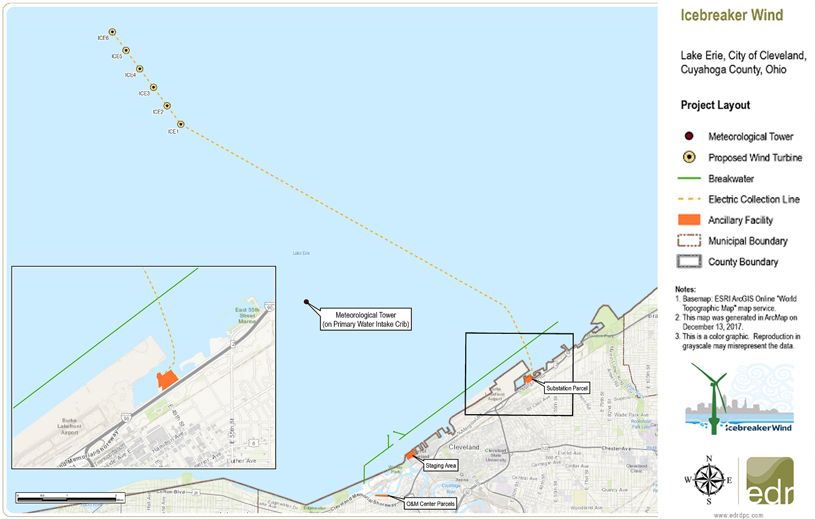On August 10, 2022, and on appeal from the Ohio Power Siting Board (OPSB), the Ohio Supreme Court upheld OPSB's prior issuance1 of a certificate of environmental compatibility and public need for the Icebreaker project,2 a 20.7 MW "demonstration" offshore wind farm that will consist of six 3.45 MW turbines located 8 miles northwest of Cleveland, Ohio in Lake Erie.

Figure 1: Icebreaker site map. See
LEEDCo - Icebreaker Wind
The court found that the appellants3 had failed to show that the OPSB, in issuing the certificate with conditions, had acted in a manner that was unlawful or unreasonable. The court also found that the OPSB issuance of the certificate did not violate the public-trust doctrine which prohibits the state—and the board as its agent—from relinquishing its ownership interest in the lake bed under Lake Erie for the benefit of a private, for-profit entity such as the Icebreaker project.
Among other issues, appellants claimed that the OPSB had failed to make required findings regarding environmental impact and instead had included responsive conditions in its decision. The court found that the inclusion of such conditions was permissible and consistent with its precedent.
Justice Sharon L. Kennedy in a dissent found that the applicable statute (R.C. 4906.10) "prohibits the board from granting a certificate for the construction, operation, and maintenance of a major utility facility unless it determines, among other things, '[t]he nature of the probable environmental impact,' R.C. 4906.10(A)(2), and '[t]hat the facility represents the minimum adverse environmental impact, considering the state of available technology and the nature and economics of the various alternatives, and other pertinent considerations,' R.C. 4906.10(A)(3)." Noting that the statute contained no exception for a "demonstration" project such as Icebreaker and that the required findings lacked necessary information, Justice Kennedy found that the OPSB lacked the authority to issue the certificate.
According to Icebreaker's webpage:
Icebreaker Wind is a unique wind energy project - the first offshore wind facility in the Great Lakes, the first freshwater wind farm in North America, and only the second offshore wind project in the entire U.S.
Demonstrating that offshore wind energy development in the Great Lakes is more complicated (as described in our prior Legal Updates) than on the Outer Continental Shelf—due to the existence and interaction of federal and state jurisdictional issues and multiple-related agencies involved—the Project is now in its eighth year of development. Yet with this recent Ohio Supreme Court decision, Icebreaker states that construction will commence in the summer of 2022 and be completed by the end of the year.
Footnotes
1. Covered in our May 29, 2020, Legal Update "In Yet Another Milestone, Icebreaker Wind Receives Key Construction Approval, but with a Potentially Untenable Condition." The referenced untenable condition—requiring that turbines be nonoperational between dusk and dawn—was subsequently removed by the OPSB on October 8, 2020, on reconsideration.
2. The development progress of the Icebreaker Wind project has been covered in our prior Legal Updates here and here and, for federal and state collaboration for offshore wind energy development in the Great Lakes, here.
3. Appellants in the case are two individual residents of a suburb of Cleveland, near the Icebreaker project.
Visit us at mayerbrown.com
Mayer Brown is a global legal services provider comprising legal practices that are separate entities (the "Mayer Brown Practices"). The Mayer Brown Practices are: Mayer Brown LLP and Mayer Brown Europe - Brussels LLP, both limited liability partnerships established in Illinois USA; Mayer Brown International LLP, a limited liability partnership incorporated in England and Wales (authorized and regulated by the Solicitors Regulation Authority and registered in England and Wales number OC 303359); Mayer Brown, a SELAS established in France; Mayer Brown JSM, a Hong Kong partnership and its associated entities in Asia; and Tauil & Chequer Advogados, a Brazilian law partnership with which Mayer Brown is associated. "Mayer Brown" and the Mayer Brown logo are the trademarks of the Mayer Brown Practices in their respective jurisdictions.
© Copyright 2020. The Mayer Brown Practices. All rights reserved.
This Mayer Brown article provides information and comments on legal issues and developments of interest. The foregoing is not a comprehensive treatment of the subject matter covered and is not intended to provide legal advice. Readers should seek specific legal advice before taking any action with respect to the matters discussed herein.

